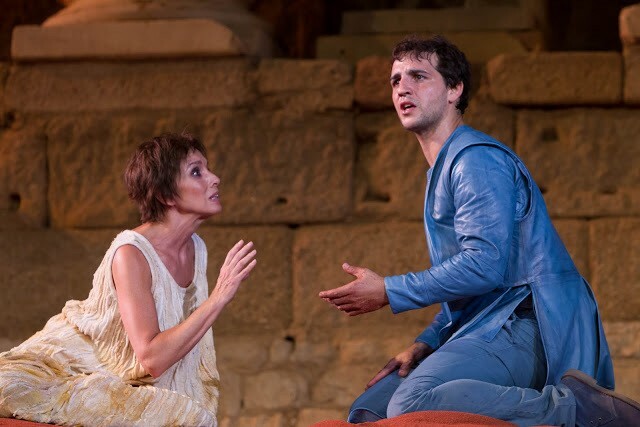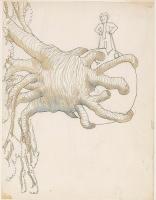Sophocles: biography and work of the author
Sophocles he was an author of Greek origin and one of the greatest classical poets of antiquity.
Although there are not many data referring to his bibliography, works of him are preserved that continue to be represented worldwide today.
The author is assigned an extensive literary production, but of the more than one hundred tragedies that he was able to leave as a legacy, only seven works remain complete today. Likewise, he contributed to the theater of the time and introduced elements that came to enrich and transform the genre.
Let's learn more about the biography and work of one of the greatest playwrights of ancient Athens.
Biography

Sophocles was born in Colono, a town bordering Athens, around 496 BC. C. in the bosom of a wealthy family. His father, Sofilo, was a gunsmith who offered him the opportunity to receive what is known as Athenian education, which cared for both the body and the mind with great importance. In this sense, the young Sophocles leaned towards dance and music, also towards gymnastics.
At age 16 he went on to lead a choir in which its members sang to the gods during the Battle of Salamis. Conflict that links three of the great Greek poets because, in 480 BC. C., not only did the battle take place, but Aeschylus participated in it and Euripides was also born.
It is believed that around the year 480 a. C. Sophocles had already started his literary career. However, it was during the Dionysian celebration in 468 BC. C, a festival around the god Dionysus where different dramatic representations took place, where he made himself known by defeating Aeschylus in the contest. A reward that led to his notoriety as a tragic poet.
Sophocles lived in a glorious context, during the great years of Athens, and his death, approximately in the year 405 a. C., coincides with the decline and the Athenian ruin which prevented him from witnessing the defeat.
Plays
The works of Sophocles are characterized by presenting a painful language. Likewise, in his tragedies the gods apply divine justice and significantly influence the future of the human being. Man is condemned to face fate and always loses in battle.
Sophocles wrote around 123 tragedies of which are only preserved 7 full: King Oedipus, Antigone, Ajax, The Traquinias, Electra, Philoctetes Y Oedipus in Colonus.
King Oedipus
It is one of Sophocles' great tragedies and one of his most admired works. Oedipus Rex perfectly meets the archetype of a classical Greek tragedy.
Although the date is unknown, it is believed that he wrote it around 430 BC. C. In it Sophocles addresses the myth of Oedipus.
After the plague devastates the city of Thebes, King Oedipus sends his brother-in-law Creon before the oracle of Delphi to find out the causes. Then, the oracle warns that the disease will not cease until the assassin of King Laius is executed. However, it is later discovered that Oedipus himself was the one who killed his father Laius and that his wife Jocasta is, in reality, his mother with whom he has had four children: Eteocles, Polynices, Ismene and Antigone. Upon learning the truth, Jocasta commits suicide and Oedipus gouges out his eyes.
Antigone
This work revolves around Antígona, the daughter of Oedipus and Jocasta. Likewise, she is the sister of Ismene, Eteocles and Polynices.
After the death of Eteocles and Polynices, in their dispute for power, Creon becomes king of Thebes, which prohibits Polynices from being buried. However, Antigone decides not to obey his orders and buries her brother.
After this event, Creon demands the death of Antigone and she is buried alive. Finally, the king ends up regretting his decision.
You may also like: Sophocles' Antigone
Ajax
It is one of the greatest tragedies of Sophocles whose main character is Ajax, one of the warriors who is part of the Trojan War.
Upon Achilles' death, Ajax believes that he deserves his weapons when the Achaeans decide to hand them over to Ulysses. This fact makes the warrior enraged and tries to assassinate all the leaders of the Greek army. However, Athena misleads him and only kills a few herds.
Finally, Ajax takes his own life. On his side, Agamemnon and Menelaus try to prevent his funeral. But Ulysses, his rival, claims that Ajax be honored with funeral acts.
Las Traquininas
The date of creation of this work is unknown, the central theme of which is Deyanira's attempt to win back her husband Heracles, who is excited about a princess named Yole.
To carry out her plan, the protagonist uses an infallible antidote to regain her husband's love for her. However, as a consequence, her idea ends up causing the death of her husband, leading the play to a fatal outcome.
Electra

King Agamemnon returns to his home after the end of the Trojan War. Then his wife Clytemnestra murders him for having sacrificed one of his daughters before going off to war to seek his luck during the battle.
Electra and Chrysotemis, the married couple's daughters, live in Mycenae and have very different lives. While the former lives in a shack, the latter enjoys life in the palace.
On his side, Orestes, the son of Agamemnon and Clytemnestra, returns to his home led by the Delphic oracle to avenge the death of his progenitor. With the help of Pílares, she devises a plan to deceive her mother.
Philoctetes
This tragedy of Sophocles was represented for the first time in the year 409 a. C. and focuses on one of the fighting heroes in Troy, Philoctetes.
Due to a wound, the combatant is abandoned by his companions on the island of Lemnos, where he spends 10 years until Ulysses, accompanied by Neoptólemo, the son of Achilles, travels there with the interest of recovering a bow inherited from Heracles, which supposedly will ensure their victory in the war.
Finally, Ulysses and Neoptólemo end up revealing to Philoctetes the true intentions of him.
Oedipus in Colonus
It is one of the tragedies that Sophocles wrote shortly before his death and was staged by his grandson with the same name after the author's death. Due to the proximity of the work with the date of death of the author, it has been wanted to see in it a certain identification of the author with old Oedipus.
Oedipus arrives with his daughter Antigone at Colono, where he is destined to die, but the locals reject him and he has to go to the king of Athens, who assures him protection.
It may interest you: Greek tragedy: key features and works.
Sophocles' contributions to the Greek tragedy
Sophocles was, above all, one of the great renovators of the 5th century BC theater. C. since he contributed great innovations, among which are:
- Increase the number of actors to three, which is known as a tritagonista. Previously there were only two actors, therefore, his contribution allows the creation of more complex plots.
- Increase the chorus from 12 to 15 members, while giving it less importance.
- It moves away from the trilogy, used by Aeschylus, and presents independent works in terms of content. Thus, each piece is seen as an isolated and autonomous work in theme.
- It brings drama to the prologue since it was previously used to explain the argument.
- He introduces the sets in his works, properly planned for each one of them.
If you liked this article, you may also be interested Sophocles' Oedipus Rex



